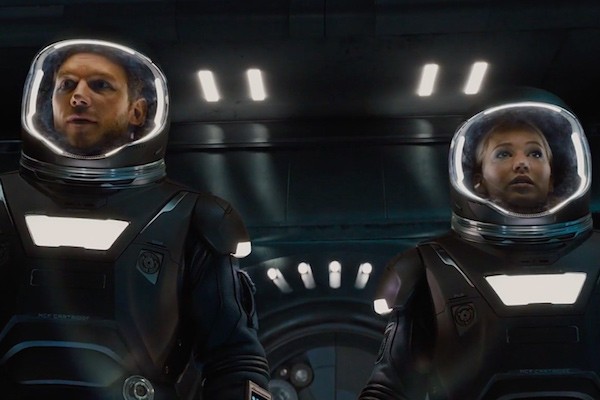Douglas Adams said it best. “Space is big. Really big. You just won’t believe how vastly, hugely, mind-bogglingly big it is.”
Combine that really impressive bigness with Einstein’s hard speed limit, and that means f you want to get anywhere in space, it’s going to take a long time. Storytellers who want to write stories that take place on other plants have come up with all sorts of work arounds, like hyperspace and warp drive, to let people get from one star to another in a human lifetime, but there’s little evidence such things could work in real life. Therefore, the other option is to extend the human lifespan by putting passengers into extended hibernation, so you go to sleep on Earth and wake up on the exoplanet of your choosing a century from now.

Chris Pratt and Jennifer Lawrence in Passengers.
That’s the departure point for Passengers. The starship Avalon’a 5,000 colonists and 200 crew are barreling towards the planet Homestead II with at half the speed of light when the ship hits an unexpected swarm of space rocks. The impact causes a power surge that wakes one of the passengers, Jim Preston (Chris Pratt), from cold sleep. The problem is, the ship is only 30 years into its 120 year journey, meaning Jim is going to die of old age long before the ship makes it to Homestead. He is destined to spend the rest of his life alone.
The good news is, he’s alone in a kilometer-long luxury hotel staffed by robots. Soon, he befriends Arthur (Michael Sheen), the bartender droid whose establishment bears a striking resemblance to the bar of the Overlook Hotel where Jack Nicholson went insane in The Shining. This is probably not a coincidence.
Passengers is a story in the tradition of “The Cold Equations”, a pulp sci fi story adapted into a Twilight Zone script that highlighted ethical problems posed by the limitations of long distance spaceflight. It’s rare for being good sci fi that doesn’t involve zapping things with ray guns. It’s a story about how technology sometimes puts people in impossible situations that no human has ever been faced with before. (Before now, no generation has had to ever learn Instagram etiquette.) Jim is on his own in deep space, and it seems to be impossible for him to get back into hibernation without the help of a whole lot of specialized equipment and a team of doctors. Should he wake someone up to get help? Or maybe just for company? Faced with a totally unique moral dilemma, he does the only logical thing and starts drinking heavily.
Eventually, he makes the worst possible decision and wakes up a fellow passenger named Aurora (Jennifer Lawrence), not because she can help out with the situation, but because he thinks she’s cute. Pratt’s lonely agonizing over the decision to basically commit slow murder by waking Aurora up 89 years early is the best part of Passengers.
Writer John Spaihts wrings as much drama and pathos as he can out of the impossible situation, carefully throwing new wrinkles into our heroes paths at regular intervals. The script for Passengers floated around Hollywood for years, and was at one point going to be produced with Keanu Reeves for $30 million instead of the $100 million that Sony spent on this production. Frankly, that might have been a better move. The production design on Passengers is top notch, but it doesn’t really add much to the interesting part of the story, even after the ship starts to break down and Jim and Aurora have to try to fix it with the help of a reanimated crewman named Gus (Lawrence Fishbourne). In the third act, the film’s courage suddenly fails as it tries to fit its unconventional story into a happy (or at least, happy-ish) ending. But hey, at least they were trying! If the preview audience I saw the film with was any indication, it still works, and will very likely provoke some extended conversations on the way home.